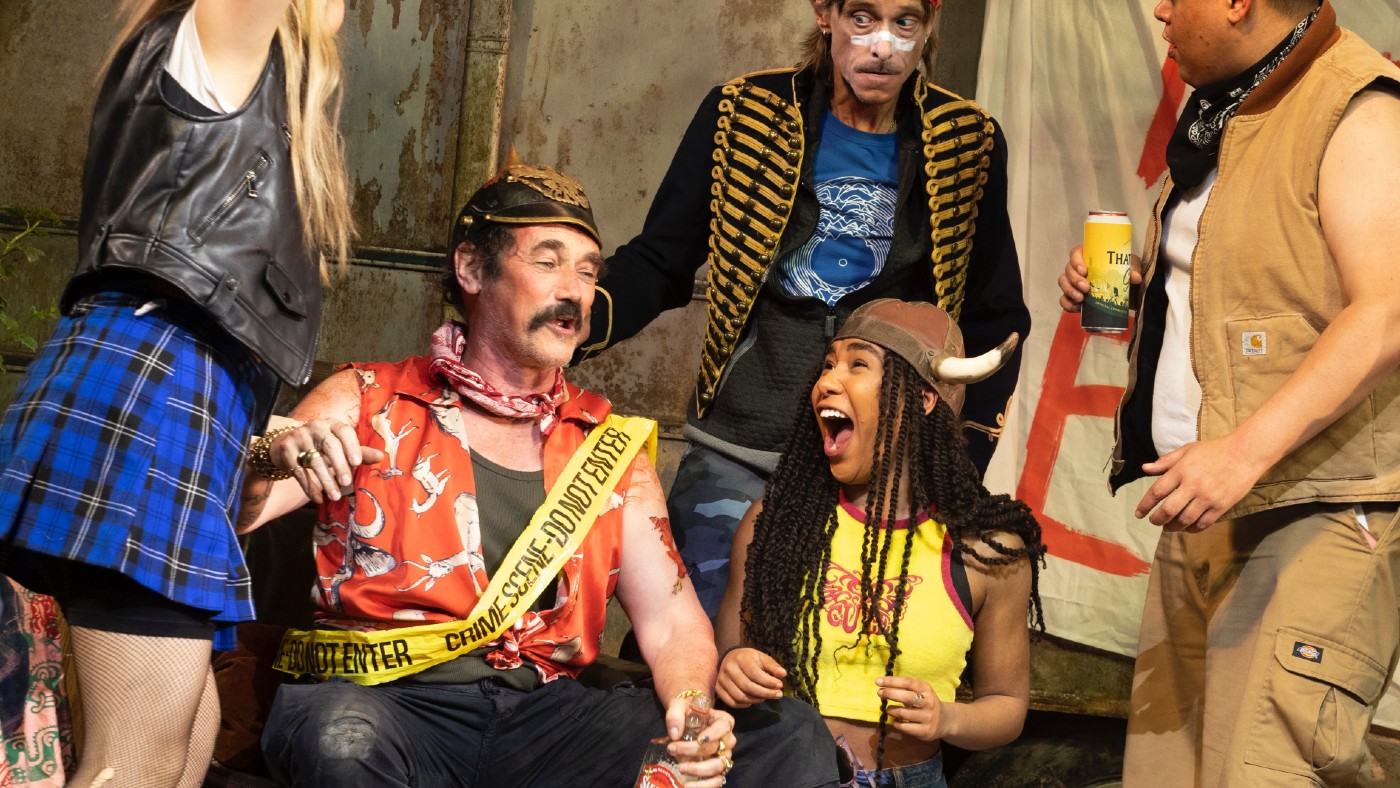Jerusalem review: Mark Rylance gives ‘the greatest performance of the century’
Back in 2009, Jez Butterworth’s play took the world by storm. Now it’s back

A free daily email with the biggest news stories of the day – and the best features from TheWeek.com
You are now subscribed
Your newsletter sign-up was successful
“There’s mighty, and then there’s Mark Rylance in Jerusalem, a performance so powerfully connected to its part that it feels almost superhuman,” said Matt Wolf in The New York Times. Back in 2009, Jez Butterworth’s play, and Rylance’s astonishing central turn in it, took the world by storm. Now it is back, once again transporting audiences to a Wiltshire wood on St George’s Day, where Johnny “Rooster” Byron – a charismatic, barrel-chested reprobate who deals drugs and parties with local youths – is facing eviction from his illegal encampment.
The production reunites Rylance, 62, with director Ian Rickson and some of the original cast, including Mackenzie Crook, who is still “heartbreaking” as Ginger, the most loyal of Rooster’s ragtag band. And it is a triumph: this is “no museum piece coasting on past kudos, but a vital experience with a revitalising effect”.
Jerusalem is “the great play of the century so far”, said Sarah Crompton on What’s On Stage. And here, “it is even better than before: the performances richer, the strain of melancholy that underpins its fierce comic energy stronger”.
The Week
Escape your echo chamber. Get the facts behind the news, plus analysis from multiple perspectives.

Sign up for The Week's Free Newsletters
From our morning news briefing to a weekly Good News Newsletter, get the best of The Week delivered directly to your inbox.
From our morning news briefing to a weekly Good News Newsletter, get the best of The Week delivered directly to your inbox.
The play’s “dark undercurrents” are also more disturbing, said Sarah Hemming in the Financial Times. It plays out in a country “ragged with argument and disputation, that has seen Brexit, rising racism, culture wars and the growth of performative patriotism”. In a world changed by #MeToo and Black Lives Matter, “the male characters’ bad-taste jokes” and casual racism “look uglier now, as do references to underage sex”; and the female characters are still “underwritten”.
On the other hand, the play’s portrayal of a group of lost souls and “malcontents” seems yet more telling, as does the brutal attack on Rooster as a “gyppo outsider”. Jerusalem is a play about mystery and the “importance of legend”, but it also interrogates the danger of myth-making, making the drama feel “sharply pertinent”.
Heretical as it may seem, I did not love Jerusalem when I first saw it, said Arifa Akbar in The Observer, with its harking back to a mythical England, filled with “energies, druids and Stonehenge giants”. And the “Little Britain-style humour” of the first act is even more jarring now. But the play is not “the sum total of its anachronisms”; it is a complicated, layered piece that in the second act expands into a “mysterious and majestic drama, enormous in its sense of tragedy. Much of this is down to Rylance’s epic performance, as physical as it is psychologically profound.” I don’t think this is the greatest play of the century, but “Rylance’s Rooster is surely the greatest performance of the century”.
Apollo Theatre, London W1. Until 7 August
A free daily email with the biggest news stories of the day – and the best features from TheWeek.com
-
 How the FCC’s ‘equal time’ rule works
How the FCC’s ‘equal time’ rule worksIn the Spotlight The law is at the heart of the Colbert-CBS conflict
-
 What is the endgame in the DHS shutdown?
What is the endgame in the DHS shutdown?Today’s Big Question Democrats want to rein in ICE’s immigration crackdown
-
 ‘Poor time management isn’t just an inconvenience’
‘Poor time management isn’t just an inconvenience’Instant Opinion Opinion, comment and editorials of the day
-
 Bad Bunny’s Super Bowl: A win for unity
Bad Bunny’s Super Bowl: A win for unityFeature The global superstar's halftime show was a celebration for everyone to enjoy
-
 Book reviews: ‘Bonfire of the Murdochs’ and ‘The Typewriter and the Guillotine’
Book reviews: ‘Bonfire of the Murdochs’ and ‘The Typewriter and the Guillotine’Feature New insights into the Murdoch family’s turmoil and a renowned journalist’s time in pre-World War II Paris
-
 6 exquisite homes with vast acreage
6 exquisite homes with vast acreageFeature Featuring an off-the-grid contemporary home in New Mexico and lakefront farmhouse in Massachusetts
-
 Film reviews: ‘Wuthering Heights,’ ‘Good Luck, Have Fun, Don’t Die,’ and ‘Sirat’
Film reviews: ‘Wuthering Heights,’ ‘Good Luck, Have Fun, Don’t Die,’ and ‘Sirat’Feature An inconvenient love torments a would-be couple, a gonzo time traveler seeks to save humanity from AI, and a father’s desperate search goes deeply sideways
-
 A thrilling foodie city in northern Japan
A thrilling foodie city in northern JapanThe Week Recommends The food scene here is ‘unspoilt’ and ‘fun’
-
 Tourangelle-style pork with prunes recipe
Tourangelle-style pork with prunes recipeThe Week Recommends This traditional, rustic dish is a French classic
-
 Samurai: a ‘blockbuster’ display of Japan’s legendary warriors
Samurai: a ‘blockbuster’ display of Japan’s legendary warriorsThe Week Recommends British Museum show offers a ‘scintillating journey’ through ‘a world of gore, power and artistic beauty’
-
 BMW iX3: a ‘revolution’ for the German car brand
BMW iX3: a ‘revolution’ for the German car brandThe Week Recommends The electric SUV promises a ‘great balance between ride comfort and driving fun’